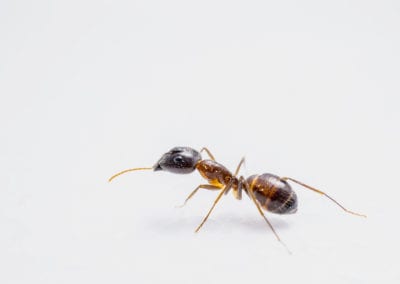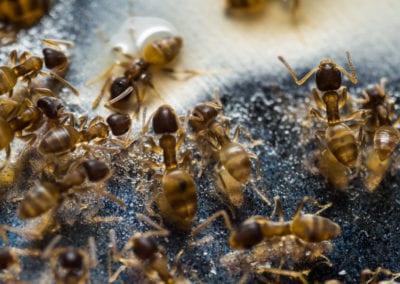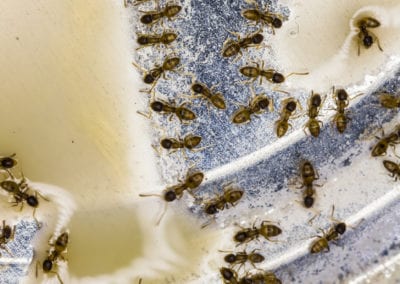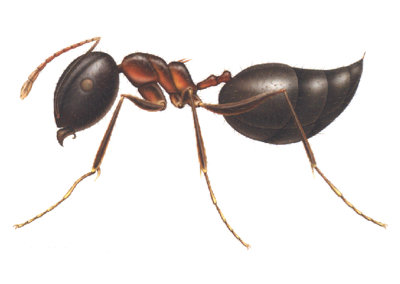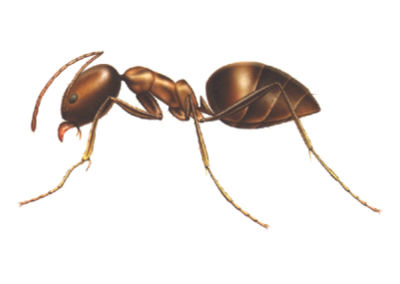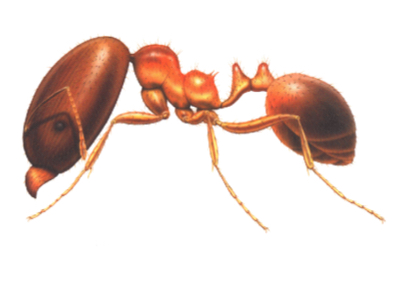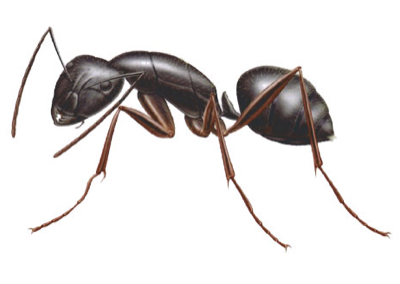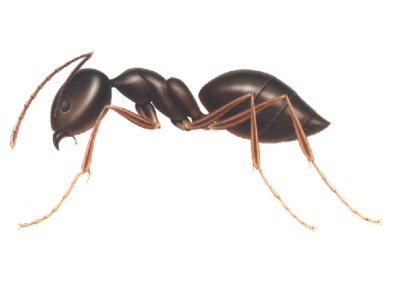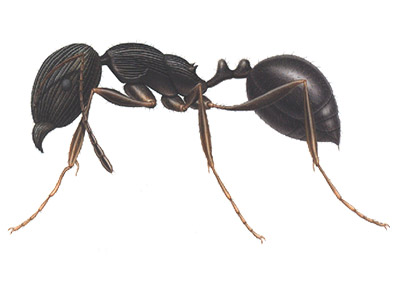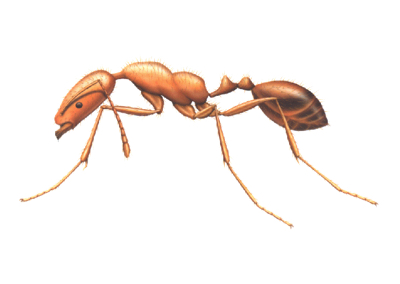Thief Ant
Our remedy for thief ant control
First, contact us. Thief ant control can be difficult. They are often mistaken for the slightly larger pharaoh ants, which are just as difficult to control. And unfortunately, the bait used for pharaoh ant control may not be effective for thief ants.
The first step is to locate their nests, by following the trail of foraging workers back from their food source. An experienced ant control professional can tell you which different baits are likely to achieve best results. He or she will properly identify the species and prescribe from there.
This species of ant, along with every other common household ant species and dozens of other pests are all covered under our Healthy Home Maintenance Program.
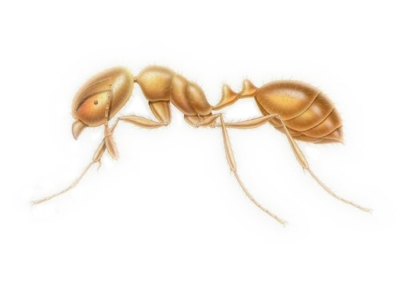
How to Identify a Thief Ant
Appearance
Golden-yellow; one of the smallest ants, 1/16- to 1/8-inch long.
Habitat
Thief ants derive their name from their habit of establishing colonies close to other ants to steal their food, and even capture and eat other ants’ eggs and larvae. They nest outdoors in soil, trash and rotten wood and tree cavities, and indoors in small crevices, woodwork and masonry. Finding the nests is extremely difficult, so thief ant control is best handled by professionals. Thief ants commonly enter structures during hot, dry weather.
Diet
Thief ants prefer high-protein foods, but will feed on sweets. They eat almost any organic matter, including insects, honeydew, seeds, meats, fruit, bread crumbs, oils, nuts, pet foods and dairy products.
Additional Imagery
Is This Your Critter?
Maybe it is, maybe it isn’t. We can handle the identification and get you a solution to your problem quickly.
Get a remedy now. Send a message!
FAQs About Thief Ants
Do Thief Ants Pose a Threat?
Thief ants, also known as grease ants, can pose a significant threat in terms of food contamination. They are attracted to greasy and protein-rich foods and can easily invade kitchens and pantries. While they do not sting, they can carry and spread harmful bacteria, making it essential to address their presence promptly.
What Are the Signs of Thief Ant Infestation?
Signs of a thief ant problem include the presence of small, yellow to light brown ants trailing to food sources. You may also notice their nests in wall voids, behind baseboards, and under countertops. These ants often travel in thin, continuous lines and can be found foraging near greasy foods and protein sources.
Do Thief Ants Bite?
Thief ants do have the ability to bite, but their bites are not typically harmful to humans. They are more of a nuisance due to their propensity to contaminate food and surfaces. Their small size allows them to enter food packaging and storage areas easily.
Can You Identify Some Thief Ant Habits?
Thief ants get their name from their habit of stealing food from other ant colonies. They are attracted to greasy and protein-rich foods, which they scavenge from kitchens and pantries. These ants can nest both indoors and outdoors, often building their colonies in wall voids, under rocks, and in soil. Their colonies can be challenging to locate and treat due to their small size and hidden nesting sites.
How to Get Rid of Thief Ants?
Getting rid of thief ants involves a thorough cleaning of the home to remove food sources. Store food in airtight containers and clean up spills promptly. Seal cracks and entry points around windows, doors, and foundations. Professional pest control services are often necessary to locate and eliminate Thief ant colonies effectively, as their nests can be difficult to find.
Where Do Thief Ants Nest?
Thief ants prefer to nest in well-hidden areas both indoors and outdoors. Indoors, they are commonly found nesting in wall voids, behind baseboards, under countertops, and inside cabinets. Outdoors, they nest under rocks, logs, and in the soil. Their nests are often difficult to detect due to their small size and hidden locations.
How Long Do Thief Ants Live?
The lifespan of a thief ant worker is typically several weeks to a few months, while queens can live for several years under favorable conditions. The colony can persist for a long time if not addressed, as queens continually produce new workers to replace those who die. Effective pest control measures are essential to disrupt their life cycle and eliminate the colony.
What Areas Do You Cover for Thief Ant Control Services?
Our thief ant control services are available within a 50 mile radius from each of our branch locations in Hammond, Michigan City, Lafayette, New Albany, Indianapolis, and South Bend. Franklin Pest Solutions is dedicated to delivering thorough and effective pest control to these communities.

Not only am I impressed with the service, professionalism and knowledge of Franklin associates but there are NO MORE ANTS on my patio table!!!
“We moved into our house 7 months ago and have been fighting an ant issue ever since. My husband and I have worked hard to clean out debris and yard waste so the ants wouldn’t have a place to nest but they always come back. We have had another pest control company come out and spray 4 times and the ants keep coming back. It’s been such a problem we have not been able to enjoy our patio dining table this summer.
Through networking I met Ben Lilly a sales associate with Franklin and told him my problem. That week he came to our house, inspected the problem and educated my husband and I about the type of ants that were colonizing our house and the proper treatment needed to get rid of them. The very next business day, Todd came out and laid a sugar bait for the ants to take back to their colony as well as sprayed around the perimeter of our house and garage. Todd was very professional and knowledgeable about the type of ant (which I know now are odorous house ants) and explained the process in detail. He mentioned that this was a problem that we happened to move into and with a few visits we would be free of ants. Not only am I impressed with the service, professionalism and knowledge of Franklin associates but there are NO MORE ANTS on my patio table!!! Thank you Ben and Todd!!!”
Gina N. | Homeowner, Louisville, KY
Safe For Your Family and Business
We’re licensed, trained, and certified by the Departments of Public Health and Agriculture, using safe, EPA-regulated materials, always.
Attacking Infestations at the Root
We don’t come in spraying. We evaluate the root of your problem, and recommend and enact pre-emptive measures before any chemicals are used.
Assessments Before Any Contracts
Our Customer Care Center walks you through every service, every charge, and every solution before you agree to anything. Our commitment is to you.

